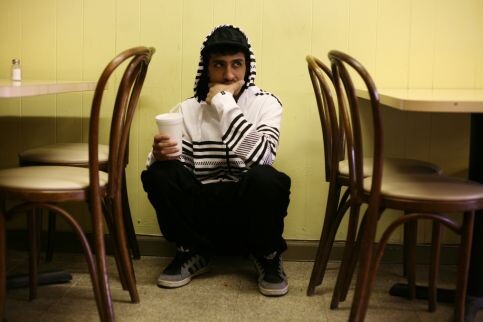The Electronic Intifada 10 December 2010

Gon (Ben Speckmann)
Chicago-based Palestinian American rapper Gon isn’t apologizing. In his recently released hip-hop album Consider Violence, Gon aggressively confronts political and personal realities, boldly lyricizing his uncompromising opinions. His album, naturally, addresses the Palestinian-Israeli conflict, but his thought-provoking verses approach topics from all aspects of life. Gon writes what he knows. And being of Palestinian descent, part of what he knows is struggle.
Gon’s beats and lyrics are crafted with a sincere attempt at quality, original hip-hop. “I’m really uncompromising when it comes to the way I do hip-hop — I have too deep of a nostalgia and an admiration for the stuff I really used to like about it,” Gon said in an interview with The Electronic Intifada. “If I want to make a record, if I want to hear something, it has to be something that doesn’t sound like anything else.”
Underneath his stage name, Gon is 24-year-old Zeid Khater, who spent part of his childhood growing up in Jordan, where much of his family lives. A graduate of Chicago’s Columbia College, after spending much of his college career writing rhymes during his classes, Khater eventually decided to start recording music and have his creations heard. He started the Urchin Studios record label with a few of his friends and fellow artists in order to be able to create music at his own will. A few years and a couple of mix tapes later, Khater came out with Consider Violence.
“Consider Violence — it sounds really polite,” Khater said of his album title. “Just because the Israeli officials are dressed in suits and they seem like the most civilized faction, does it mean that their war is more polite, so to speak? It doesn’t make you less of a terrorist if you’re wearing a suit and a tie.”
Despite Khater’s subject matter and provocative lyrics, he is not asking for any radical change. He is simply inviting people to listen, inviting them to think. In his single “White Flag,” he satirizes the idea of protesting and invoking change with his music — “Peace in Palestine, they say resist with rap, how cute, we’ll make a song and then they’ll give it back,” he writes.
The album isn’t about Palestine or for Palestine, Khater explained, but as a Palestinian the struggle manifests itself into who he is, and thus into his music. “It becomes a part of your personality,” Khater said. “You grow up and you’re used to it and it still bothers with you, but it just becomes an extension of who you are. Which is why I make songs about Palestine and still don’t perceive this to be a political album. It’s just me talking about things that I feel and believe are true.”
The voice and perspective Khater presents in his music is one seldom heard in the US, though it is one that represents many individuals. “I definitely do get a lot of gratification knowing that people are hearing this side of the fence [through my music],” Khater said. “Hearing the social things that I talk about, from the perspective of a Muslim, from the perspective of a younger Arab guy who’s lived in the Midwest for most of his life. I don’t think there’s anyone else that can fill that void, at least not right now.”
Listening to Khater aka Gon’s work, one can get the sense that he chooses his words without regard to expectations or appearances. His lyrics and beats communicate what he is truly compelled to say, delivering a refreshing, insightful experience for his audience.
Maryam Jameel is a sophomore at Northwestern University, where she studies journalism and Middle East studies.
Related Links


